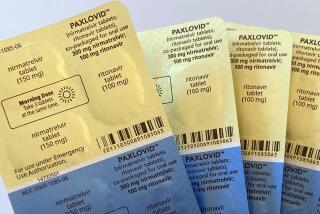AIDS Patients May Get Unproven Drugs at Early Stages : Health: Only one experimental therapy is now available outside of formal studies. And one must be critically ill to be eligible to receive it.
- Share via
WASHINGTON — AIDS-infected persons could be eligible for promising but unproven experimental drugs at an earlier stage of the disease, according to the draft policy statement of a new federal program to provide access to drugs outside formal clinical trials.
Currently, the only experimental AIDS drug available to patients not in a formal study is the anti-viral drug DDI, and it is available only to critically ill patients who cannot take other therapies. But AIDS patients who cannot participate in formal testing of promising new treatments have argued in recent years that the choice of taking experimental drugs should be theirs, regardless of a drug’s unknown potential to cause harm.
A plan to expand that choice, known as “parallel track” trials, was announced last summer, but has not yet been implemented. Tuesday, details of how the proposed plan will work and who might be eligible were discussed at an AIDS conference sponsored by the Institute of Medicine.
“We are talking about people who are very clearly at high risk of serious illness in the immediate future--people at a stage of infection where the risk from disease could be far greater than the risk of taking a drug very early in development,” said Dr. James Allen, director of the National AIDS Program Office. “We are not talking about infected individuals with intact immune systems.”
Clinical trials typically compare patients receiving a medication to similar patients who either receive a different dose of the medication, another medication or no medication. Such comparisons allow the benefits and toxicities of a new medication to be accurately determined. These trials usually have narrowly defined and rigid criteria for entry.
The “parallel track” program, on the other hand, allows individuals who are otherwise ineligible for formal clinical trials to have access to the same drug while the formal trials are proceeding.
The risk in taking such drugs was demonstrated in recent reports that six AIDS patients taking the experimental DDI died of pancreatitis, a known toxic effect of the medication, in the five months since the government made the drug available to more than 8,000 patients early in the research process. On the other hand, experimental drugs can offer promise to terminally ill patients who have nowhere else to turn.
The federal proposal discussed Tuesday says that the patient population eligible for parallel track will include those with fully developed AIDS and those “at imminent health risk due to HIV-related immunodeficiency.” HIV, or human immunodeficiency virus, causes AIDS.
The virus can remain dormant in the body for several years before it begins to attack its primary target, the critical T4 cells of the immune system. As the level of T4 cells begins to deplete, individuals typically become vulnerable to a range of life-threatening infections and can become quite ill very quickly. A person with a level of 200 T4 cells or fewer--normal is 800 to 1,200--would be considered “at imminent health risk.”
The language of the draft proposal was designed to “set out criteria (with) adequate flexibility” and does not necessarily mean that infected individuals without overt signs of illness would be automatically entitled to experimental drugs, said Allen.
Under parallel track, an individual strategy will be developed for each drug, and a specific patient population will be defined for that particular drug, Allen said. He said that specific regulations will also be proposed to define circumstances and mechanisms to terminate expanded availability “since they (such mechanisms) do not now exist.”
“We need to try this as an experiment . . . ,” he said. “If this is successful, there will be a lot of talk to extending it more broadly. But we need to restrict it at this time.”






